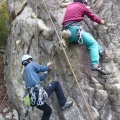Laurent Binet – HHhH
Laurent Binet’s HHhH – Himmlers Hirn heißt Heydrich – a great book about one of the many dark chapters of the Second World War, diluted by the author’s affectation and self-infatuations.
The book tells the story of Jozef Gabčík and Jan Kubiš, who assassinated the SS-Obergruppenführer and General der Polizei Reinhard Heydrich, one of the main architects of the Holocaust.
The same is true for this book: the story is cruel, the protagonists are moving, and I am ridiculous.
Laurent Binet, HHhH, ch.251
Full of anecdotes around the story, the book suffers from numerous chapters of self-reflection of the author Laurent Binet, where he puts him self to close in line with the main actors of the book. How can he dare to compare himself over and over again with those who fought for their freedom? Fortunately, in one of the last chapters he has an insight into his own endeavor.
Told in many very short notes, the book starts with Heydrich’s life and development within the Nazi regime, until he reached the position of Reichsprotektor (Deputy/Acting Reich-Protector) of Bohemia and Moravia. The story then switches to England where the president in exile Edvard Beneš initiates Operation Andropoid with the target to assassinate Heydrich. Two soldiers, Slovak Jozef Gabčík and Czech Jan Kubiš are parachuted to their homeland, overcoming many obstacles they manage to attack Heydrich on 27 May 1942, who dies from his injuries a week later.
Following the assassination (attempt), an incredible hunt starts to find the assailants, which is successful only due to a traitor in the rows of the resistance. The two, and some more, are found hidding in a church, where they fight a last time, holding out until they were flooded in the crypta of the church.
Although I knew about the story before reading this book, the amount of details, the amount of ferocities and reprisals that happened around that time, took me by surprise. In particular, the complete annihilation of two villages, Lidice and Ležáky, which were falsely linked the assassins, was new to me.
This book, a great success in France, would have been an excellent and very recommendable one, wouldn’t it be for the many chapters where the author indulges himself, especially in the second half, into self-reflections about his problems writing the book, his relationships, his doubts. I think it would have served the book better to have the main part clean of these distracting and annoying parts, and add it to a preface, appendix, or in some other way.
In spite of this, the book is very well written, I couldn’t stop reading it, in fact I stopped reading all other books (I normally read 4-6 at a time) and concentrated only on this one. So there is something in this book that is special.


